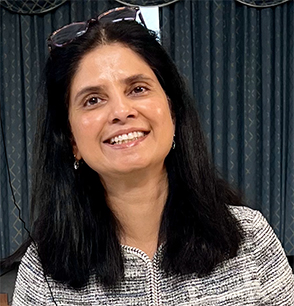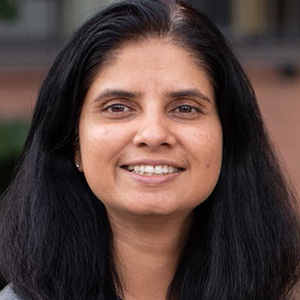Catalyzing change and redefining purpose
I arrived in the U.S. from India for my postdoctoral training enticed by the prospects of exciting science and an incredible environment at the National Institutes of Health. Instead of being a temporary stop, this country became my newfound home, where I envisioned building my professional career and raising my family. The journey to secure a faculty position for a dual-career scientific couple was a long, rocky road that ultimately brought me to Howard University College of Medicine in 2011.

Establishing an independent research program, navigating the tenure process and striving for promotion consumed my focus, and those early years seemed to pass in a blur. However, I also felt a strong desire for change, and a deeper sense of purpose emerged within me. Occupied with interim leadership responsibilities, coordinating medical courses, teaching and mentoring students, participating in committees and managing my research endeavors and grants, I had little time or need to contemplate revitalization — or so I convinced myself.
One day, during the early pandemic lockdown, I received an unexpected email from an investigator at the National Human Genome Research Institute, inviting me to join a collaborative study probing the genetic basis of COVID-19 susceptibility and manifestations. Howard University Hospital primarily serves patients from underrepresented communities, so recruiting our participants for this study was pivotal in comprehending the disproportionate impact of COVID-19 on African Americans and other ethnic groups.
Although it was challenging, spearheading this project — obtaining IRB approval, assembling a clinical team, and leading the endeavor — promised not just a learning opportunity for a basic scientist like me; it also gave me a profound purpose. The samples we collected from our patients held the potential to unravel the underlying health disparities in COVID-19.
I directed the project at our site, gathering samples from COVID-19 patients that contributed to an important publication. Representing Howard University and our patients in this work was a humbling experience. With this scientific detour during an unprecedented time in history, I was able to shift focus from the constraints the pandemic imposed on my lab's research progress and productivity. I was given an extraordinary opportunity to make a substantial impact. Above all, this experience highlighted my yearning to be an active member of a broader community, where I could both contribute to and benefit from the expertise and knowledge of my peers.
Early on, my success as a scientist meant acquiring deep expertise to address crucial research questions, measured by grants and publications. Transitioning to a faculty role broadened my focus to include teaching and service, critical for promotion and shaping the perception of success. As I reflect, I realize that my definition of success has changed over time, propelled by professional and personal circumstances, and I have needed to embrace the challenges and redefine my purpose.
Career reinvention and reinvigoration: four stories
To mark Women’s History Month, four members of the American Society for Biochemistry and Molecular Biology’s Women in Biochemistry and Molecular Biology Committee, known as the WIBMB, have written personal essays about their career journeys.
Read them all:
Pursuing the call to change by Karlett Parra
Catalyzing change and redefining purpose by Sudha Sharma
Building community by Megan Filbin
The power of sabbaticals by Nicholas Rhind
Enjoy reading ASBMB Today?
Become a member to receive the print edition four times a year and the digital edition monthly.
Learn moreFeatured jobs
from the ASBMB career center
Get the latest from ASBMB Today
Enter your email address, and we’ll send you a weekly email with recent articles, interviews and more.
Latest in Careers
Careers highlights or most popular articles

Sketching, scribbling and scicomm
Graduate student Ari Paiz describes how her love of science and art blend to make her an effective science communicator.

Embrace your neurodivergence and flourish in college
This guide offers practical advice on setting yourself up for success — learn how to leverage campus resources, work with professors and embrace your strengths.

Upcoming opportunities
Apply for the ASBMB Interactive Mentoring Activities for Grantsmanship Enhancement grant writing workshop by April 15.

Quieting the static: Building inclusive STEM classrooms
Christin Monroe, an assistant professor of chemistry at Landmark College, offers practical tips to help educators make their classrooms more accessible to neurodivergent scientists.

Unraveling oncogenesis: What makes cancer tick?
Learn about the ASBMB 2025 symposium on oncogenic hubs: chromatin regulatory and transcriptional complexes in cancer.

Exploring lipid metabolism: A journey through time and innovation
Recent lipid metabolism research has unveiled critical insights into lipid–protein interactions, offering potential therapeutic targets for metabolic and neurodegenerative diseases. Check out the latest in lipid science at the ASBMB annual meeting.

